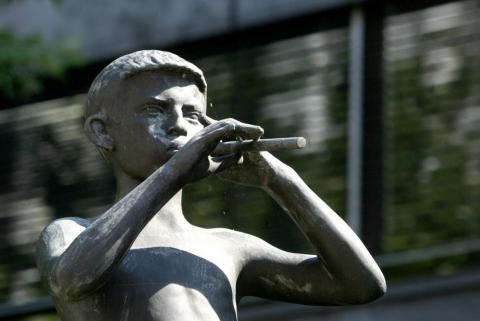RTV Slovenija journalists continue strike amid blows from higher-ups

Ljubljana – RTV Slovenija journalists continued on Monday the strike they first staged on 23 May, ending the day with a rally protesting against political interference. The public broadcaster’s heads meanwhile ordered that news shows be radically short or cancelled today, a move the staff see as an attempt to undermine the strike.
The RTV Slovenija leadership has decided to limit the TV news show aired at 5pm to only three minutes and to shorten the main daily TV news shows Dnevnik and Odmevi to only five minutes, whereas the former usually takes about 20 minutes and the latter about 30 minutes. The weekly show Tednik has been cancelled.
The news shows were being prepared to go on air in their full length and scope, providing, among other things, information about the strike. Helena Milinkovič, the head of the strike committee, accused those in charge of censorship in a statement for Dnevnik.
The strike committee said in a press release that RTV Slovenija director general Andrej Grah Whatmough and TV news programme editor-in-chief Jadranka Rebernik “have interfered gravely with our strike”, adding that this was a criminal offence.
Moreover, the move is a serious violation of journalistic autonomy and censorship violates the public’s right to information, the strike committee said in the press release.
Tednik host Jelena Aščić said that the news show wanted to show the situation at RTV Slovenija, but Rebernik ordered all production capacities cancelled “without providing a single reason or an explanation”.
The journalists are also very critical of Rebernik’s decision not to allow taping an interview with UEFA president Aleksander Čeferin. The interview was to discuss topical issues and also touch on his attitude toward a public broadcaster.
“The fact that the editor-in-chief explicitly and actively prevented the taping of the interview, even with the possibility to air it some other time, shows that somebody does not want comprehensive, critical and broad reporting on important social issues,” said veteran journalist Igor E. Bergant.
The strike committee was also adamant in their criticism of what they see as Grah Whatmough’s efforts to blame the journalists’ negotiators for the crisis in the newsroom. They called on him to “immediately stop misleading the public and employees, bullying employees and causing chaos”.
Ksenija Horvat, the head of journalists’ negotiators, said at the evening rally near the National Assembly that the decision to call the strike was one of the hardest in her life, adding however, that it was very necessary.
She warned that good journalists have been leaving the broadcaster due to the situation, called for modern new legislation to help the broadcaster and asked the public to continue their support.
The rally featured a number of speakers, among them representatives of journalistic associations from abroad conveying their support, as well as representatives of a number of trade unions.
Film director Metod Pevec was one of the many creators who took the floor, expressing belief that the ultimate objective was to fragment the broadcaster and make it an easy and cheap target for privatisation.
Pevec said that if RTV Slovenija disintegrates, so will the nation, because the attack on RTV Slovenija is only one symptom of a much wider process of trying to disintegrate society.
Also today, RTV Slovenija’s programme council was set to discuss a proposal to shrink the TV’s foreign correspondence network, but postponed its session to tomorrow, as Grah Whatmough said he could not attend due to the strike.
The idea to considerably cut the network of correspondents has been criticised not only by journalists but also by Culture Minister Asta Vrečko earlier in the day. Vrečko also expressed support for the strike.
Prime Minister Robert Golob meanwhile said today that his parliamentary coalition was dealing with an opposition that was trying to defend RTV Slovenija’s leadership, thus worsening the crisis at the broadcaster.
He believes that the situation will improve through “depoliticisation” of the broadcaster, which he expects by the end of the year, by which time his party’s changes to relevant legislation will have been passed in parliament, giving more power to the civil society and employees.
However, the parliament will only be able to debate the coalition’s changes to the RTV Slovenija act after completing the debate on two bills the opposition Democrats (SDS) filed before the coalition submitted their own.
Today, the chair of the parliamentary Culture Committee Tamara Vonta of Golob’s Freedom Movement called a session of the committee for Wednesday to discuss journalistic autonomy violations at RTV Slovenija.
The post RTV Slovenija journalists continue strike amid blows from higher-ups appeared first on Slovenia Times.
- Log in to post comments
